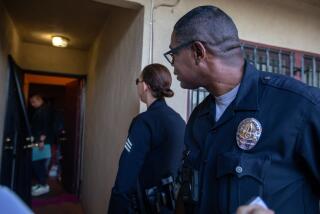Campaign Against DARE Program Launched : Drug education: Opponents say psychological technique--letting children make choices--is harmful.
- Share via
FT. COLLINS, Colo. — Parents in Ft. Collins have launched a campaign against the DARE anti-drug program, saying police are using discredited psychological techniques that harm children.
A researcher who has spent four years studying the program calls the charges “ridiculous.” He says he has proof that the program works, although he admits some changes are needed.
Gary Peterson, a 39-year-old businessman, formed Parents Against DARE after his 9-year-old son, Troy, came home from Moore Elementary School with pamphlets outlining the Drug Abuse Resistance Education program.
“I don’t think the police officers who teach this program to students realize what they’re doing to kids,” Peterson said. “They’re telling children they can make their own decisions about drugs. Our research has shown a pattern of failure for this technique.
“I don’t want my children being given that message. I’ve told my children that drugs are illegal, and they won’t use them, period. They have no choice in this matter,” Peterson said.
Peterson’s anti-DARE group has about 100 members. Their immediate goal is to remove DARE from the Ft. Collins school system, but some members also have appeared on national talk shows, hoping to drum up support for a fledgling nationwide campaign against DARE.
DARE was developed by Los Angeles Police Chief Daryl F. Gates in 1983, a joint effort by Los Angeles police and the Los Angeles Unified School District to reduce drug abuse and discourage gang membership.
The program called for police to teach a formal curriculum in classrooms. In 1986, the program was expanded to reach all 345 elementary and 58 junior high schools in Los Angeles.
Gates invited other jurisdictions for 80 hours of intensive DARE training. Officers from 33 states representing 398 agencies now use DARE, and it is supported by the U.S. Justice Department.
According to the DARE manual, distributed by the U.S. Department of Justice, “DARE instructors do not use the scare tactics of traditional approaches that focus on the dangers of drug abuse. Instead, the instructors work with children to raise their self-esteem, to teach them how to make decisions on their own, and to help them identify positive alternatives to tobacco, alcohol, and drug use.”
Students are required to draw up lists of reasons to use drugs and reasons not to use drugs. They also participate in group therapy, known as “magic circles,” discussing drug use and participating in role-playing that sometimes involves a child taking the part of a drug user.
Dr. W.R. Coulson, who studied under Dr. Carl Rogers--father of the type of group therapy techniques employed by DARE counselors--said DARE is dangerous. And he said Rogers later repudiated his own theories.
Coulson, who also is director of research at the Council of Ethno-Psychology in California, said police with only 80 hours of training are using psychological techniques to teach students to make decisions about drugs. He said only trained psychologists should use those techniques.
“This is wrong, because it teaches students to make decisions about an activity that the law says is illegal,” Coulson said. “Let children decide what flavor of ice cream they want, but not whether or not to do drugs.”
He said research has shown the program works in the first year or so, when students accept the message that drug abuse is wrong. But later, when they decide to try drugs, “the DARE program has already taught them that they can make their own decisions, so they try it,” he said.
DARE has strong support nationwide.
The Alabama DARE Officers Assn., led by Sgt. Charles Thompson of the Winston County Sheriff’s Department, launched a successful campaign in April against state legislation that would have required teachers to tell students drug abuse is illegal.
“We do not use scare tactics against drugs,” Thompson said. “You remember the programs where the police officers came in with a night stick and beat on the table and screamed and hollered? It didn’t work.”
Richard Clayton, director of the Center For Preventive Research in Lexington, Ky., has studied the DARE program since 1987 and says police do not need extensive psychological training to teach DARE.
“There will be situations where the student will have to make a decision about whether or not to use drugs, and the parents won’t be there,” Clayton said. “Kids will have to make a decision, and they have to have the skills.”
More to Read
Sign up for Essential California
The most important California stories and recommendations in your inbox every morning.
You may occasionally receive promotional content from the Los Angeles Times.













